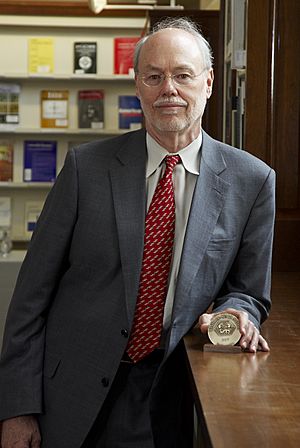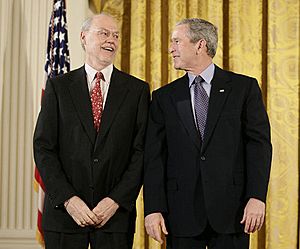Phillip Allen Sharp facts for kids
Quick facts for kids
Phillip Allen Sharp
|
|
|---|---|

Sharp with the Winthrop-Sears Medal in 2007
|
|
| Born | June 6, 1944 Falmouth, Kentucky, U.S.
|
| Education |
|
| Spouse(s) |
Ann Holcombe
(m. 1964) |
| Children | 3 |
| Awards |
|
| Scientific career | |
| Fields | Biologist |
| Institutions | |
| Doctoral students |
|
Phillip Allen Sharp, born on June 6, 1944, is an American scientist. He is a geneticist and molecular biologist. He helped discover something very important called RNA splicing. This discovery showed that genes are not simple, continuous strings of information. Instead, they have parts called introns that need to be removed.
For this amazing discovery, he shared the 1993 Nobel Prize in Physiology or Medicine. He won it with Richard J. Roberts. Their work helped us understand how our bodies use DNA to make different proteins. Phillip Sharp also received the 2015 Othmer Gold Medal.
Today, Sharp's research looks at tiny pieces of RNA. These are called small RNAs and other non-coding RNAs. His lab tries to find out what these tiny RNAs do. They also study how these small RNAs help control genes. This research is important for understanding how our bodies grow and react to stress.
Contents
Early Life and Education
Phillip Sharp was born in Falmouth, Kentucky. His parents were Kathrin and Joseph Walter Sharp. In 1964, he married Ann Holcombe. They have three daughters together.
Sharp went to Union College. There, he studied chemistry and mathematics. He then earned his Ph.D. in chemistry in 1969. This was at the University of Illinois at Urbana-Champaign.
After his Ph.D., he continued his training. He worked at the California Institute of Technology until 1971. There, he studied small DNA circles called plasmids. Later, he joined the Cold Spring Harbor Laboratory. He worked with James D. Watson. At this lab, he studied how genes work in human cells.
Career at MIT
In 1974, Phillip Sharp was invited to work at MIT. This is the Massachusetts Institute of Technology. He was offered a position by biologist Salvador Luria.
Sharp held many important roles at MIT. From 1985 to 1991, he led MIT's Center for Cancer Research. This center is now called the Koch Institute for Integrative Cancer Research. He was also the head of the Biology department from 1991 to 1999. From 2000 to 2004, he founded and directed the McGovern Institute for Brain Research.
He is currently an Institute Professor at MIT. This is the highest rank for a professor there. He is also a Professor of Biology Emeritus. He is a member of the Koch Institute. Sharp also helps lead the advisory board of the MIT Jameel Clinic.
Sharp helped start several important companies. These include Biogen, Alnylam Pharmaceuticals, and Magen Biosciences. He has also served on the boards of these companies.
Awards and Achievements
Besides the Nobel Prize, Sharp has received many other awards. In 2004, he won the National Medal of Science. This is a very high honor in the United States. In 1999, he received the Benjamin Franklin Medal for Distinguished Achievement in the Sciences. This award is from the American Philosophical Society.
He also won the Golden Plate Award in 1981. This was from the American Academy of Achievement. In 1988, he shared the Louisa Gross Horwitz Prize with Thomas R. Cech. This prize is from Columbia University.
Sharp is a member of many important science groups. These include the American Academy of Arts and Sciences and the National Academy of Sciences. In 2011, he became a Foreign Member of the Royal Society. In 2012, he was chosen to be the president of the American Association for the Advancement of Science.
A documentary film about him is planned for 2025. It is called "Cracking the Code:Phil Sharp and the Biotech Revolution." The middle school in Pendleton County, Kentucky, where Sharp was born, is named after him.
Community Involvement
Phillip Sharp enjoys sharing his knowledge with young people. In October 2010, he took part in the USA Science and Engineering Festival. He joined the "Lunch with a Laureate" program. Here, middle and high school students could talk informally with a Nobel Prize winner. Sharp is also on the festival's Advisory Board.
In 2011, he was listed as one of the top innovators from MIT. This was on the MIT150 list. He also advises Xconomy, a news site about science and technology. He is on the Board of Scientific Governors at The Scripps Research Institute.
In 2016, Sharp helped organize a letter. This letter supported "Precision Agriculture." It was written to explain the benefits of GMOs (genetically modified organisms). It also supported golden rice.
See also
 In Spanish: Phillip Allen Sharp para niños
In Spanish: Phillip Allen Sharp para niños
- History of RNA biology
- List of RNA biologists
- MIT Department of Biology
 | Kyle Baker |
 | Joseph Yoakum |
 | Laura Wheeler Waring |
 | Henry Ossawa Tanner |


